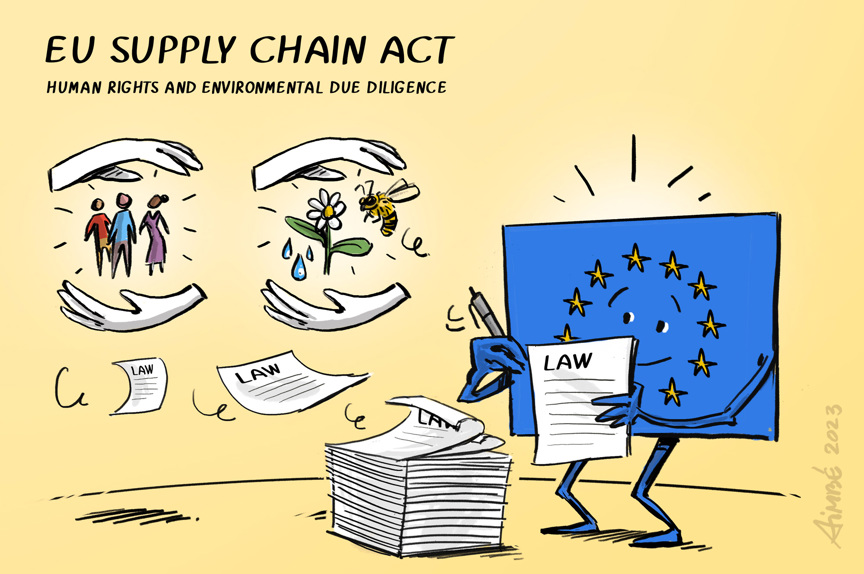- Sustainability , Corporate Law and M&A , Commercial and Economic Law
- EU supply chain act , CS3D , Directive on corporate sustainability due diligence , due diligence , due diligence regulations , due diligence in supply chains , human rights , sustainability
Last year, the European Commission introduced a proposal known as the Directive on corporate sustainability due diligence (“the CS3D”also “The EU Supply Chain Act”).
Since then, significant progress has been made on the topic of conducting human rights and environmental due diligence, both within specific jurisdictions and at the European Union (EU) level.
Various EU Member States have either enacted or are in the process of enacting legislation supply chain due diligence (such as the German Act on Due Diligence in Supply Chains).
In this article we will discuss the national initiatives within the EU that are focused on developing due diligence frameworks alongside the EU-wide process of the CS3D.In a second article we will threat the current status of the CS3D and the anticipated timeline for its approval and implementation.

1. National initiatives within the EU focusing on due diligence in supply chains
National initiatives within the EU focusing on developing due diligence frameworks alongside the EU wide process of the EU Supply Chain Act, are taken by categorised 4 different categories of states, namely: the countries that have regulated the matter (a), the countries willing to regulate, but have stalled law adoption due to the upcoming directive (b), countries who don’t have an overarching regulation but are regulating sector by sector (c), and finally countries who have nothing of the above (d).
a. Countries having supply chain due diligence regulations into force
France adopted in 2017 a law on the Duty of care/Duty of vigilance.
Germany has a German law on Supply Chain due diligence Act (Lieferkettensorgfaltspflichtengesetz, short: “LkSG”). Due to economic ties, this law already impacts companies in Austria, Hungary, Slovenia, Slovakia, Bosnia Herzogovina.
While transposing the actual Directive on Non-Financial Reporting (which will be replaced by the European Supply Chain Act) Portugal has adopted a legislation on corporate social responsibility, which requires large companies to report on their social, environmental and ethical performance .
b. Countries being in the process of regulating value chains, but stopped due to the upcoming EU Directive.
Belgium submitted a law proposal for a duty of vigilance in april 2021, but the process has been stalled following the announcement of the EU CS3D.
In the Netherlands, an initiative bill for Responsible and Sustainable International Business was submitted on March 11, 2021. The Dutch proposal is more far-reaching than the CS3D and is facing a lot of resistance in parliament because of fears that a stricter regime in the Netherlands would hinder the local economy.
Austria has a draft for a Social Responsibility Law, stalled for the same reasons.
Spain's preliminary law draft for the protection of human rights, sustainability and due diligence in transnational business activities has been in the drawer since last May and is still pending for approval, also waiting on the EU CS3D.
c. Countries that are regulating sector by sector
For example, Austria has regulations on construction, renewable energy, finance. Those regulations are applicable to all companies, no matter their size.
The Macedonian Stock Exchange has adopted an ESG reporting guideline that is a practical tool for listed companies on ESG-related.
In Sweden, the environmental code touches upon topics relevant to the EU CS3D, but without the same due diligence obligations and formalities.
d. None of the above
Malta, Croatia, Slovakia are highly impacted by the German Act.
Albania, Bosnia and Herzegovina, Serbia are all not part of the EU, but their economy is highly dependent on trade with the EU and their legislation is thus harmonized with the EU legislation.
Note: in these countries, teams have reported that the economy is mainly made of SMEs so they expect low adoption amongst companies.
5. Conclusion
All in all, many submissions mentioned the fact that the scope of application (‘big companies’) is too narrow to significantly impact and/or involve local companies. Many fear the increased administrative burden.
Countries that were in the process of adopting similar legislation decided to wait to harmonise obligation and avoid being too strict, and hence, less competitive.
If you have any questions on this subject, please do not hesitate to contact our specialists: +32 (0)2 747 40 07 or info@seeds.law.





